 Your new post is loading...
 Your new post is loading...

|
Scooped by
Gust MEES
November 11, 2024 1:58 PM
|

|
Scooped by
Gust MEES
July 25, 2024 3:14 PM
|

|
Scooped by
Gust MEES
February 1, 2023 3:33 PM
|

|
Scooped by
Gust MEES
January 25, 2023 9:45 AM
|

|
Scooped by
Gust MEES
April 22, 2022 8:53 AM
|
Hologramm-Doktor: Nasa „holoportiert“ Ärzte auf die ISS
Auf der ISS wird Star Trek Realität: Wie die Nasa mitteilt, „holoportierten“ sich erstmals Mediziner auf die Raumstation. Dazu wurde unter anderem eine Microsoft Hololens Kamera und Technologie des Startups Aexa Aerospace verwendet. Learn more / En savoir plus / Mehr erfahren: https://www.scoop.it/t/21st-century-learning-and-teaching/?tag=Hologram

|
Scooped by
Gust MEES
April 22, 2021 8:21 AM
|
Nach dem ersten Helikopter-Flug von Ingenuity auf dem Mars, dem in Kürze ein zweiter Flug folgen wird, feiert die NASA in dieser Woche auch noch einen weiteren Erfolg: Zum ersten Mal wurde direkt auf dem Mars atembarer Sauerstoff erzeugt, wie die NASA meldet. Der im Februar gelandete sechsrädige Roboter Perseverance trägt ein "toastergroßes" experimentelles Instrument, welches auf den Namen "Mars Oxygen In-Situ Resource Utilization Experiment" getauft wurde. Oder kurz: MOXIE.
Die NASA weist darauf hin, dass der Begriff "Moxie" auch ein alter Begriff in der englischen Sprache für eine Persönlichkeitseigenschaft sei. Jemand mit "Moxie" gelte als mutig, abenteuerlustig, abgehärtet und temperamentvoll.
Am 20. April wurde ein Experiment durchgeführt, bei dem aus der aus 96 Prozent Kohlendioxid bestehenden Mars-Atmosphäre insgesamt fünf Gramm Sauerstoff erzeugt wurde. Dieser würde dazu ausreichen, um einen Menschen 10 Minuten lang mit atembaren Sauerstoff zu versorgen. Laut der NASA könne MOXIE um die 10 Gramm Sauerstoff pro Stunde auf dem Mars erzeugen, im Rahmen der aktuellen Mars-Mission seien in den nächsten zwei Jahren noch neun weitere Experimente geplant, bei denen MOXIE zum Einsatz kommen soll. Das erste kurze Experiment habe vor allem dazu gedient festzustellen, ob MOXIE die Reise von der Erde zum Mond gut überstanden hat. Bei den nächsten Experimenten werden dann unter anderem Betriebsmodi und die Effizienz zu verschiedenen Tageszeiten und atmosphärischen Bedingungen getestet.

|
Scooped by
Gust MEES
August 25, 2019 11:22 AM
|
RAUMFAHRT-REVOLUTION: NASA PLANT NUKLEAREN ANTRIEB FÜR REISE ZUM MARS
23.08.2019 • 10:56
© Wochit
Schneller durchs Weltall reisen! Die NASA möchte einen nuklearen Antrieb nutzen, um die Reise zum Mars deutlich zu verkürzen. Wie Wissenschaft.de berichtet, spricht NASA-Chef Jim Bridenstine von einer Revolution für die gesamte Raumfahrt. Learn more / En savoir plus / Mehr erfahren: https://www.scoop.it/t/21st-century-innovative-technologies-and-developments/?&tag=Space

|
Scooped by
Gust MEES
January 11, 2018 6:46 PM
|

|
Scooped by
Gust MEES
April 13, 2017 3:36 PM
|
Life on Earth developed slowly over billions of years, and often it seems the modern process of looking for life beyond our own planet moves at a similarly glacial pace. But on Thursday, scientists announced another tantalizing lead in our species-wide quest to answer that great existential question: Is anyone or anything else alive beyond this rock of ours?
Researchers from NASA's Cassini mission say something's happening in a hidden ocean beneath the icy shell of Saturn's moon Enceladus. It's too early to say anything is swimming around down there, but it's becoming clearer that many of the ingredients that allow life to survive in deep, dark underwater environments on Earth can also be found on the Saturnian satellite. Learn more / En savoir plus / Mehr erfahren: http://www.scoop.it/t/21st-century-innovative-technologies-and-developments/?&tag=Space

|
Scooped by
Gust MEES
April 4, 2017 3:27 PM
|
Die NASA hat mal wieder Großes geplant: In fünf Jahren will die US-Raumfahrtbehörde damit beginnen, einen Weltraumbahnhof zu bauen. Der soll um den Mond kreisen und Reisen zu weit entfernten Punkten im All ermöglichen – beispielsweise zum Mars.
Die NASA stellte kürzlich die Baupläne für das beeindruckende Bauprojekt vor: Der Weltraumbahnhof wird in der Umlaufbahn des Mondes entstehen – und das schon im Jahr 2023. Dann wird der Bau beginnen. Ist die Weltraumbasis fertig, wird sie Zwischenstopps auf dem Weg zu fernen Zielen im All möglich machen. Und dank Wohn- und Forschungsräumen werden auch längere Aufenthalte und Experimente im All für Astronauten kein Problem mehr darstellen. Learn more / En savoir plus / Mehr erfahren: http://www.scoop.it/t/21st-century-innovative-technologies-and-developments/?&tag=Space

|
Scooped by
Gust MEES
September 27, 2016 4:56 AM
|
Astronomen der US-Raumfahrtbehörde Nasa haben nach eigenen Angaben weitere Anzeichen für die Existenz von Wasserdampf-Geysiren auf der vereisten Oberfläche des Jupiter-Monds Europa entdeckt. Europa, einer der mehr als 50 Monde des Gasgiganten, gilt laut Nasa als einer der "Top-Kandidaten" für die Existenz von Leben außerhalb der Erde.
Europa ist etwas kleiner als der Erdmond und vollständig von Eis bedeckt. Unter dem Eispanzer vermuten Astronomen einen bis zu 100 Kilometer tiefen Ozean, der mehr Wasser enthält als alle irdischen Meere zusammen. Learn more / En savoir plus / Mehr erfahren: http://www.scoop.it/t/21st-century-innovative-technologies-and-developments/?tag=Space

|
Scooped by
Gust MEES
September 22, 2016 10:23 AM
|
I poked my head inside NASA's latest Mars rover. During a mixed-reality demonstration at the Jet Propulsion Laboratory (JPL) in Pasadena... The ability to investigate the design of NASA's latest spacecraft, which is being engineered for the next mission to Mars in 2020, makes ProtoSpace a unique use for Microsoft's augmented-reality headset. The project enables JPL designers and engineers to not only visualize their designs as virtual 3-D objects, but also pinpoint potential problems that could affect space missions along the way. Back in Pasadena, ProtoSpace is engaging engineers in a new kind of interaction with their spacecraft design. The vehicle, which is essentially a Computer Assisted Design (CAD) model in holographic form, appears as a floating, dynamic animation. You can do things like slip your arm through the brightly colored parts and bolts that are projected in front of you. But what the rover lacks in definition it makes up for in presence. Unlike the CAD design on a flat computer screen, mixed-reality technology brings a full-scale replica of the rover to life inside a room. Learn more / En savoir plus / Mehr erfahren: http://www.scoop.it/t/21st-century-learning-and-teaching/?tag=Mixed+Reality http://www.scoop.it/t/21st-century-innovative-technologies-and-developments/?tag=Mixed+Reality http://www.scoop.it/t/la-realite-augmentee-augmented-reality-ar

|
Scooped by
Gust MEES
February 3, 2015 4:09 AM
|
|

|
Scooped by
Gust MEES
July 25, 2024 3:40 PM
|
NASA sends 4K video from a flying plane to the ISS using lasers
900 Mbps from Earth to orbit, and I still can't get reliable Wi-Fi in my backyard
Jealous of the fact that the International Space Station has better internet than you do? Well, here's one more benchmark to envy: NASA has successfully streamed 4K video from an in-flight aircraft to the ISS and back again. Learn more / En savoir plus / Mehr erfahren: https://www.scoop.it/t/21st-century-innovative-technologies-and-developments/?&tag=Space

|
Scooped by
Gust MEES
May 9, 2023 7:19 AM
|

|
Scooped by
Gust MEES
January 28, 2023 4:19 PM
|

|
Scooped by
Gust MEES
January 24, 2023 3:22 PM
|
Nasa has unveiled plans to test nuclear-powered rockets that would fly astronauts to Mars in ultra-fast time.
The agency has partnered with the US government’s Defense Advanced Research Projects Agency (Darpa) to demonstrate a nuclear thermal rocket engine in space as soon as 2027, it announced on Tuesday.
The project is intended to develop a pioneering propulsion system for space travel far different from the chemical systems prevalent since the modern era of rocketry dawned almost a century ago.
“Using a nuclear thermal rocket allows for faster transit time, reducing risk for astronauts,” Nasa said in a press release. Learn more / Mehr erfahren: https://www.scoop.it/t/21st-century-innovative-technologies-and-developments/?tag=Space

|
Scooped by
Gust MEES
May 21, 2021 12:41 PM
|

|
Scooped by
Gust MEES
October 26, 2020 12:34 PM
|
Having dropped tantalising hints days ago about an "exciting new discovery about the Moon", the US space agency has revealed conclusive evidence of water on our only natural satellite.
This "unambiguous detection of molecular water" will boost Nasa's hopes of establishing a lunar base.
The aim is to sustain that base by tapping into the Moon's natural resources.
The findings have been published as two papers in the journal Nature Astronomy.
While there have previously been signs of water on the lunar surface, these new discoveries suggest it is more abundant than previously thought. "It gives us more options for potential water sources on the Moon," said Hannah Sargeant, a planetary scientist from the Open University in Milton Keynes, told BBC News. Learn more / Mehr erfahren: https://www.scoop.it/t/21st-century-innovative-technologies-and-developments/?tag=Space

|
Scooped by
Gust MEES
June 7, 2018 3:49 PM
|
No, NASA hasn’t discovered life on Mars yet—but a new result makes it seem like maybe, at some point in the planet’s history, the conditions were ripe for some extraterrestrial beings. Maybe.
The scientists behind experiments conducted by the Curiosity rover are today reporting two results that make the Red Planet’s story even more interesting. One group found carbon-containing organic matter in 3.5-billion-year-old rock. Another noticed the methane levels around Curiosity varied by the season. Combined, these results present tantalizing hints of a potentially habitable Martian past.
From everything we can tell of the chemistry and the minerals deposited in the Gale crater where Curiosity is stationed, “we think it was a habitable environment,” Jennifer Eigenbrode from the NASA Goddard Space Flight Center told Gizmodo. “It had the ability to support life—but doesn’t mean life were there. Learn more / En savoir plus / Mehr erfahren: https://www.scoop.it/t/21st-century-innovative-technologies-and-developments/?&tag=Mars

|
Scooped by
Gust MEES
November 22, 2017 10:17 AM
|
NASA initially worked with Goodyear in the mid-2000s to develop a prototype spring tire. These tires were composed of a flexible mesh with hundreds of coiled steel wires. It gave the tires the ability to support heavy loads with good traction, but even the strongest steel springs deform. On Mars, rolling over rocks while carrying a heavy loadout of instruments would cause the steel to change shape over time.
The answer was a new material based on a stoichiometric nickel-titanium alloy. Like regular spring tires, there’s no air inside. It’s just a lattice of coiled metal that flexes as it rolls over obstacles. That means it won’t get punctured by sharp Martian rocks. The bonds in the nickel-titanium alloy can rearrange in response to stress instead of stretching, so the tire snaps back — no deformation.
NASA plans to use shape memory tires on future Mars rovers, possibly even on the upcoming 2020 rover that will take over for Curiosity in the next few years. It’s even possible we could see this design on Earth-based tires one day. Learn more / En savoir plus / Mehr erfahren: https://www.scoop.it/t/21st-century-innovative-technologies-and-developments/?&tag=Mars

|
Scooped by
Gust MEES
April 4, 2017 3:38 PM
|
DEEP SPACE GATEWAY:
Nasa plant Raumhafen zwischen Erde und Mond
Zum Mars bitte hier umsteigen: Die Nasa will eine Raumstation zwischen Erde und Mond aufbauen, die als Zwischenstation für Missionen im Sonnensystem dienen soll. Boeing ist einer der Partner bei dem Projekt.
Nächster Halt: kurz vor dem Mond. Übernächster Halt: Mars. Die US-Raumfahrtbehörde National Aeronautics And Space Administration (Nasa) will eine Raumstation aufbauen, die als Zwischenstation für Weltraummissionen dienen soll. Boeing zeigt, wie diese aussehen könnte. Learn more / En savoir plus / Mehr erfahren: http://www.scoop.it/t/21st-century-innovative-technologies-and-developments/?&tag=Space

|
Scooped by
Gust MEES
February 22, 2017 2:29 PM
|

|
Scooped by
Gust MEES
September 22, 2016 3:52 PM
|

|
Scooped by
Gust MEES
August 7, 2015 5:20 PM
|
Fresh food grown in the microgravity environment of space is officially on the menu for the first time for NASA astronauts on the International Space Station.
|



 Your new post is loading...
Your new post is loading...



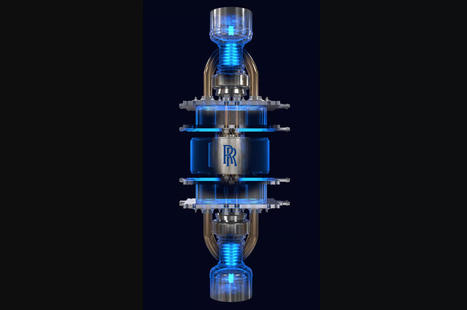
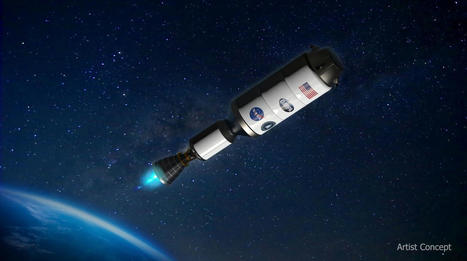
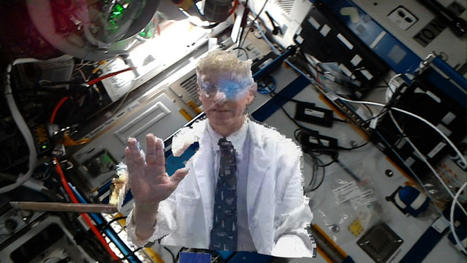
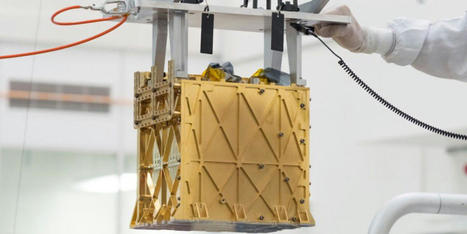
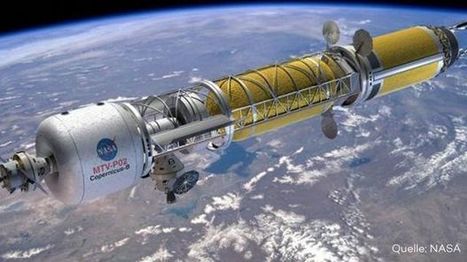
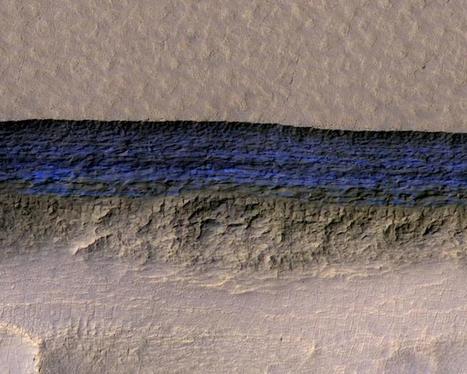
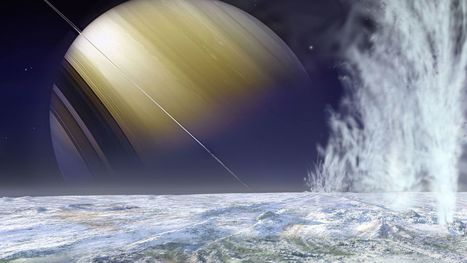
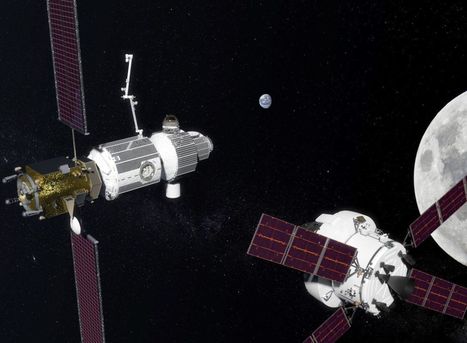

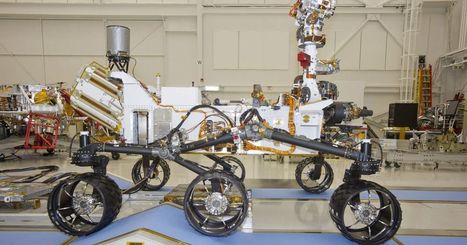
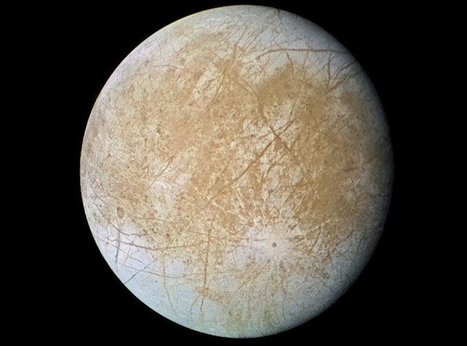
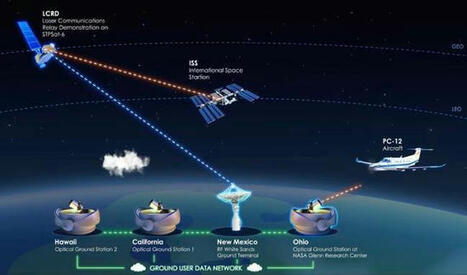
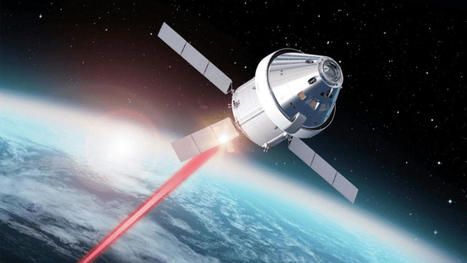
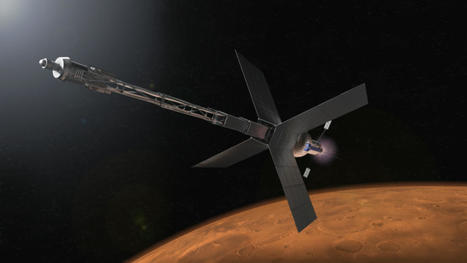
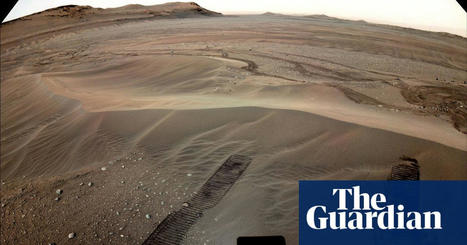

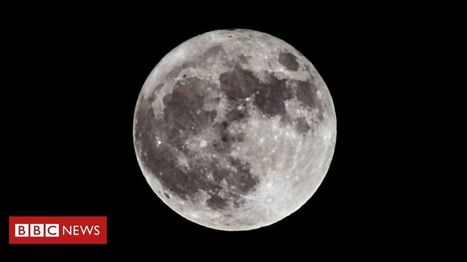
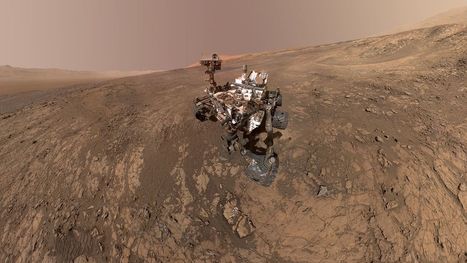
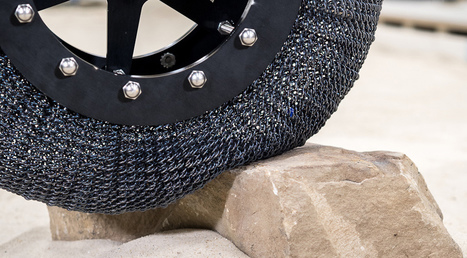
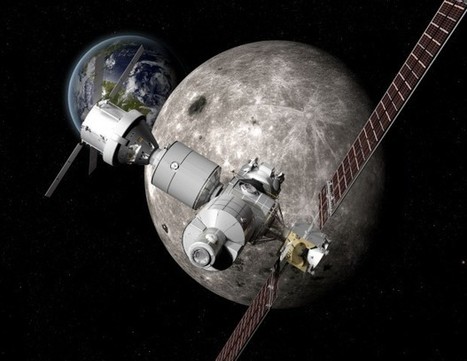

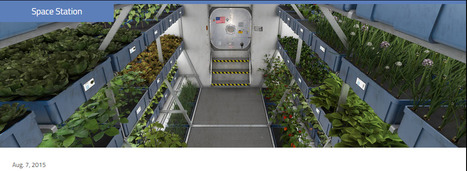





SpaceX Wants to Give Mars Its Own Version of Starlink
'Marslink' would allow at least 4Mpbs of data to travel to the Red Planet and back.
NASA is hunting for a partner capable of equipping Mars with steady internet connectivity, and SpaceX is convinced it's the right company for the job. A presentation shared Thursday reveals that SpaceX is working on a Mars iteration of Starlink called "Marslink," which would use dedicated satellites to relay information to and from the Red Planet.
Learn more / En savoir plus / Mehr erfahren:
https://www.scoop.it/t/21st-century-innovative-technologies-and-developments/?&tag=Mars
https://www.scoop.it/topic/21st-century-innovative-technologies-and-developments/?&tag=Space